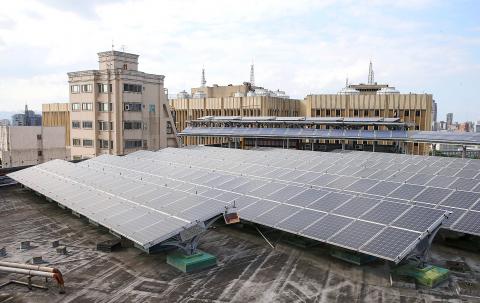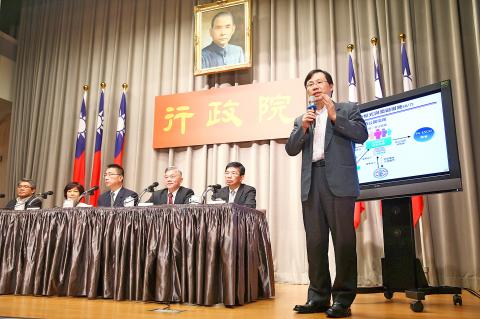The Cabinet has approved a plan to subsidize the construction and design costs of residential rooftop solar systems, starting next year, as part of its efforts to boost solar power generation.
A stimulus package introduced yesterday would offer subsidies to households installing rooftop solar systems, covering 40 percent of construction costs and 100 percent of design costs, from next year to 2020, Minister of Economic Affairs Shen Jong-chin (沈榮津) said.
The government would also offer subsidies for the construction of public solar power stations in remote areas and Aboriginal lands, covering 100 percent of design costs, Shen said.

Photo: CNA
It would offer a subsidy of up to NT$600,000 for each power station for the construction of power lines, and would promise to purchase the extra electricity generated, Shen added.
The package is part of the government’s efforts to phase out nuclear power and increase the share of renewable energy to 20 percent of the nation’s power supplies by 2025.
The government hopes to increase the power generation capacity of rooftop solar systems from 410 megawatts at present to 3,000 megawatts by 2020, Shen said.

Photo: CNA
The government would first target homes with the goal of converting communities into solar power plants, and then encourage people living in remote areas to install rooftop solar systems and build public power stations, he said.
It would also require private companies that consume more than 800 kilowatts of electricity per month to construct rooftop solar power systems, Shen said.
“The domestic market will be bolstered with the development of rooftop systems. The solar panel industry, iron factories, electricians and the shipping industry will all benefit,” Shen said.
The package also eases building restrictions on illegal rooftop structures.
Owners of illegal structures would not be able to apply for a license to build solar systems, but the Cabinet is planning to lift the ban to allow solar panels to be placed on such structures if the combined height does not exceed 4.5m, Deputy Minister of the Interior Hua Ching-chun (花敬群) said.
“However, that does not mean illegal structures will be legalized. Those structures are still illegal even if they are topped with solar panels, but the solar panels could be kept even if the structures are demolished,” Executive Yuan spokesman Hsu Kuo-yung (徐國勇) said.
Premier William Lai (賴清德) said that the growth of renewable energy can create jobs and increase Taiwan’s global influence.
The Cabinet also plans to establish a legal platform to eliminate gray areas in the law for start-ups and innovators in a bid to build a friendly investment environment.
The platform, to be led by the National Development Council, is to smooth out legal uncertainties encountered by businesses that are developing a new business model.
The Cabinet said that in principle it would allow everything that is not prohibited by the law.

CHAOS: Iranians took to the streets playing celebratory music after reports of Khamenei’s death on Saturday, while mourners also gathered in Tehran yesterday Iranian Supreme Leader Ayatollah Ali Khamenei was killed in a major attack on Iran launched by Israel and the US, throwing the future of the Islamic republic into doubt and raising the risk of regional instability. Iranian state television and the state-run IRNA news agency announced the 86-year-old’s death early yesterday. US President Donald Trump said it gave Iranians their “greatest chance” to “take back” their country. The announcements came after a joint US and Israeli aerial bombardment that targeted Iranian military and governmental sites. Trump said the “heavy and pinpoint bombing” would continue through the week or as long

TRUST: The KMT said it respected the US’ timing and considerations, and hoped it would continue to honor its commitments to helping Taiwan bolster its defenses and deterrence US President Donald Trump is delaying a multibillion-dollar arms sale to Taiwan to ensure his visit to Beijing is successful, a New York Times report said. The weapons sales package has stalled in the US Department of State, the report said, citing US officials it did not identify. The White House has told agencies not to push forward ahead of Trump’s meeting with Chinese President Xi Jinping (習近平), it said. The two last month held a phone call to discuss trade and geopolitical flashpoints ahead of the summit. Xi raised the Taiwan issue and urged the US to handle arms sales to

State-run CPC Corp, Taiwan (CPC, 台灣中油) yesterday said that it had confirmed on Saturday night with its liquefied natural gas (LNG) and crude oil suppliers that shipments are proceeding as scheduled and that domestic supplies remain unaffected. The CPC yesterday announced the gasoline and diesel prices will rise by NT$0.2 and NT$0.4 per liter, respectively, starting Monday, citing Middle East tensions and blizzards in the eastern United States. CPC also iterated it has been reducing the proportion of crude oil imports from the Middle East and diversifying its supply sources in the past few years in response to geopolitical risks, expanding

Pro-democracy media tycoon Jimmy Lai’s (黎智英) fraud conviction and prison sentence were yesterday overturned by a Hong Kong court, in a surprise legal decision that comes soon after Lai was jailed for 20 years on a separate national security charge. Judges Jeremy Poon (潘兆初), Anthea Pang (彭寶琴) and Derek Pang (彭偉昌) said in the judgement that they allowed the appeal from Lai, and another defendant in the case, to proceed, as a lower court judge had “erred.” “The Court of Appeal gave them leave to appeal against their conviction, allowed their appeals, quashed the convictions and set aside the sentences,” the judges